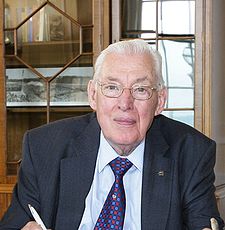“I have bedimmed
The noontide sun, called forth the mutinous winds,
And ’twixt the green sea and the azured vault
Set roaring war; to the dread rattling thunder.”
— Prospero, The Tempest
So the BBC has finally pulled together a three part documentary on the life of Ian Paisley (Snr). You can find all three episodes of the House of Paisley on the iPlayer here. It’s a tall order to tell an authoritative story of one so complex and controversial.
It’s hard to stay between the ditches of hagiography and demonisation of someone who dominated our lives for so long. My own attempt back in 2007 fulfilled an ambition I’d had to write for Prospect Magazine ever since it launched in October 1995.
In the early years of the Troubles his nightly jousts with the leaders of moderate nationalism were both infuriating and distressing, given each grisly day’s work by loyalist and republican murder gangs trailed only a few hours before in the Bel Tel.
The documentary captures a Trumpian model of populist politician long before it entered Trump’s head to even think about politics. His tactical use of controversial being enough to increase his appeal and support even when he lost the argument.
And over time it allowed him to take out almost every rival to power from Terrence O’Neill, through Faulkner, Harry West and eventually the man who perhaps thought he had finally caged the Paisley-ite tiger with the Belfast Agreement, David Trimble.
This limited ad interim approach oddly mirrored the Provisional’s ‘Tactical Use of Armed Struggle’ policy, which while only codified in later stages of the Troubles, described the ad hoc nature of their war. It was a peculiarly symbiotic relationship.
The limitations of Paisleyism perhaps only became obvious after he gave up his brief tenure on the ultimate seat of power (or more accurately) power-sharing (a concept he had roundly condemned when it only included moderate nationalists) in 2008.
Once in a position of power, his party could not think of anything they could constructively do with it and retain the power base other than to block anything of any worth that might come from the other side. In Sinn Féin they had an able partner.
As Paisley took office, his deputy Peter Robinson promised “a battle a day”. But it was an idea quickly subverted by the incongruous sight of a Paisley-McGuinness double act dubbed ‘the Chuckle Brothers’ (See also David McKee’s Two Monsters).
As I wrote in towards the end of that 2007 essay:
…it is hard to escape the conclusion that there is something unfair about Paisley winning the laurels for a deal for which he has risked so little. A former adviser to David Trimble, Paul Bew, broadly welcomes the settlement, but has concerns about what kind of leadership the two parties of the former extremes can provide for the future:
“It would surely have been better if Northern Ireland were proceeding on the basis of moderate, democratic nationalism in partnership with moderate democratic unionism, and that those people who were prepared to take political risks be the leaders of a new society, rather than those who made the least effort and only moved when they had both become kings of their own sectarian community.”
His one bona fide claim to have contributed to lasting peace was his insistence not upon IRA decommissioning (already in), but that Sinn Féin commit themselves (officially) to support the police: a Rubicon that would prove hard for them to ‘uncross’.
It left some long term supporters wondering at the incongruence of one who played a key role in destabilising Northern Ireland in the 60s claiming to be its ultimate peacemaker: which Paisley had been wrong, the earlier man or this latter day ‘saint’?
If you missed it all happening LIVE, then this series is definitely worth a watch to catch up with the broader themes of his life and times. But it’s worth too, remembering just who and what won his long argument with mainstream politics in the end.
“The art of progress is to reserve order amid change,
and to preserve change amid order.”
— Alfred North Whitehead
Mick is founding editor of Slugger. He has written papers on the impacts of the Internet on politics and the wider media and is a regular guest and speaking events across Ireland, the UK and Europe. Twitter: @MickFealty
Discover more from Slugger O'Toole
Subscribe to get the latest posts to your email.
